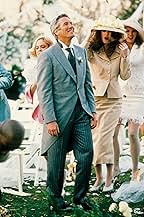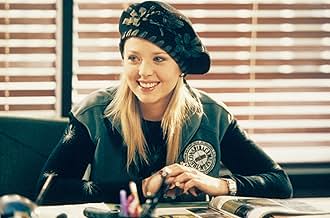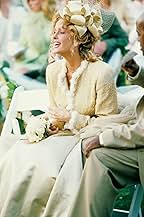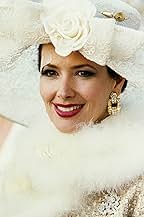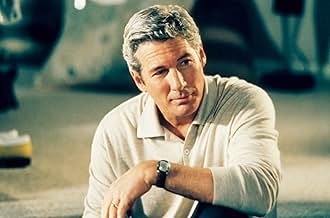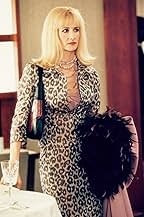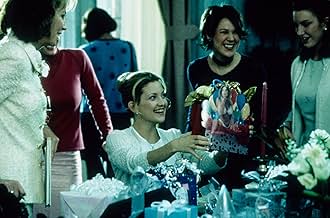A wealthy gynecologist's ideal life is thrown into turmoil when the women closest to him begin to affect his life in unexpecting ways.A wealthy gynecologist's ideal life is thrown into turmoil when the women closest to him begin to affect his life in unexpecting ways.A wealthy gynecologist's ideal life is thrown into turmoil when the women closest to him begin to affect his life in unexpecting ways.
- Awards
- 4 nominations total
Holly Pelham
- Joanne
- (as Holly Pelham-Davis)
- Director
- Writer
- All cast & crew
- Production, box office & more at IMDbPro
Featured reviews
Robert Altman is frustratingly inconsistent, and here is at his worst. His very personal style has three characteristics:
1. Many-threaded storylines and characters, many of which raise questions that are not answered in the play. When done well, you get the impression of moving through the world with a curious voyeurism, dipping into many lives which are intriguing enough to learn more about. Except for the youngest daughter, none of these women are worth digging more into. The misogynism could have been an advantage; here it is cheap.
2. Spontaneous acting. Altman doesn't tell his actors what to do, trusting them to bring something fresh. In the best case, the differing visions of the actors add to the manyhued effect described above. But you need powerful actors like he had in "Cookie's Fortune." These folks, some of whom are fine when given direction, simply can't synthesize.
3. Wonderful tracking shots (which move from character to character so enhance the two effects noted above). Check out the first shot in "The Player." That alone is worth the admission. Here, we have a busily choreographed shot at the beginning and a dizzy pullback at the end, but neither to any useful effect.
Avoid this film. The master was asleep.
1. Many-threaded storylines and characters, many of which raise questions that are not answered in the play. When done well, you get the impression of moving through the world with a curious voyeurism, dipping into many lives which are intriguing enough to learn more about. Except for the youngest daughter, none of these women are worth digging more into. The misogynism could have been an advantage; here it is cheap.
2. Spontaneous acting. Altman doesn't tell his actors what to do, trusting them to bring something fresh. In the best case, the differing visions of the actors add to the manyhued effect described above. But you need powerful actors like he had in "Cookie's Fortune." These folks, some of whom are fine when given direction, simply can't synthesize.
3. Wonderful tracking shots (which move from character to character so enhance the two effects noted above). Check out the first shot in "The Player." That alone is worth the admission. Here, we have a busily choreographed shot at the beginning and a dizzy pullback at the end, but neither to any useful effect.
Avoid this film. The master was asleep.
I'm sorry, but I like this movie. It might just be my defense of Robert Altman, but I think that this is a good comedy. Dr. T who devotes his life to taking care of women, but never considers how they could take care of themselves. He loves everything about women, and women love him. However, nothing he can do can protect them in the end.
The problem is that this film was presented as a movie for women: a date movie that you can drag a boyfriend or husband to in order to prove love and devotion. The film is actually examining women, their needs and relationships with or without a strong male figure. This isn't a chick flick; it's an analytic comedy. So, the intended movie date turns out to be a disappointment for both parties who have no idea what to expect.
The only positive aspect of this whole misunderstanding is that now, years later, Dr. T ends up on the cheap rack at any DVD store. So don't rent it, buy it, give it another look and even if you don't like it, sell it for even cheaper. When this movie is available for less than a dollar, no one will have any excuse not to watch it. Several of the people will end up actually liking it.
The problem is that this film was presented as a movie for women: a date movie that you can drag a boyfriend or husband to in order to prove love and devotion. The film is actually examining women, their needs and relationships with or without a strong male figure. This isn't a chick flick; it's an analytic comedy. So, the intended movie date turns out to be a disappointment for both parties who have no idea what to expect.
The only positive aspect of this whole misunderstanding is that now, years later, Dr. T ends up on the cheap rack at any DVD store. So don't rent it, buy it, give it another look and even if you don't like it, sell it for even cheaper. When this movie is available for less than a dollar, no one will have any excuse not to watch it. Several of the people will end up actually liking it.
I saw "Dr. T and the Women" when it premiered at the Chicago Film Festival in 2000. Robert Altman was there, as were Richard Gere and Shelley Long, two of the film's stars. The theatre was buzzing with excitement as the movie started (big starry film premiers are still a novelty in a city like Chicago), and by the time it ended, you could almost physically feel the deflation in the auditorium as everyone realized at the same time that the film was a bomb.
Because I went into the film so hyped and the movie tanks so badly toward its end, I came out thinking it was probably Altman's worst film. After re-watching it on DVD a few days ago, I realize now that the film isn't nearly as disastrous as I remember it being. The final 15 minutes still stink, but all of the movie leading up to those final moments isn't that bad.
Those who call Altman a misogynist are being unfair to him; his body of work contains a large collection of fully realized female characters. If they are frequently treated badly in his films (and many of them are), it's important to remember that it's the male characters treating them that way, not Altman. If anything, a running theme in Altman's work is the crap women have to take from the men in their lives, and several of his films feel like atonements for all the ways boys behave badly.
It's unfortunate, then, that the one film that exists almost exclusively as an homage to women and the beautiful chaos they create in the lives of men is full of female caricatures and cartoon types. Not a single female character in this movie feels like a three-dimensional creation, and it's a shame because there is plenty of talent assembled to play them. Gere actually manages to give one of the better performances of his career as the man whose picture-perfect life begins to unravel because of the unpredictable female tidal wave bearing down on him, but the screenplay doesn't bring his story or anything else to any kind of conclusion. How ironic that the film was written by a woman.
Altman has always been willing to take risks, and for that I applaud him. But his experiments in this film fail badly. After sticking with a meandering story for nearly two hours, it's as if the film's creators decided they didn't know how the hell they wanted their movie to end, shrug their shoulders and give their audience the finger. The tone abruptly changes into one of slapstick comedy that comes out of nowhere, and a surreal ending that might have worked if anything leading up to it had prepared the audience for it feels stupid.
The female cast includes Helen Hunt, Farrah Fawcett, Shelley Long, Kate Hudson, Tara Reid, Laura Dern, Lee Grant and Janine Turner. Fawcett's barely in the movie; Long and Dern, while providing many of the film's laughs, are asked to do embarrassing things; Turner apparently just turned up on the set one day and Altman set about finding something for her to do. I think we're supposed to see all of these women taken together as representing the different facets of every woman's personality, but none of the women in this movie resembles any woman I actually know.
The highlight of the film comes early -- it's a tremendous single tracking shot during the opening credits set in a gynecologist's office. Everything after that is downhill.
Still, the nadir of Altman's oeuvre that I measure every other film of his against is "Beyond Therapy" (1987), and this movie isn't nearly as bad as that. It's not even as bad as "Quintet" or "Popeye," and I have to say that it beats "A Wedding" in a squeaker.
Grade: C
Because I went into the film so hyped and the movie tanks so badly toward its end, I came out thinking it was probably Altman's worst film. After re-watching it on DVD a few days ago, I realize now that the film isn't nearly as disastrous as I remember it being. The final 15 minutes still stink, but all of the movie leading up to those final moments isn't that bad.
Those who call Altman a misogynist are being unfair to him; his body of work contains a large collection of fully realized female characters. If they are frequently treated badly in his films (and many of them are), it's important to remember that it's the male characters treating them that way, not Altman. If anything, a running theme in Altman's work is the crap women have to take from the men in their lives, and several of his films feel like atonements for all the ways boys behave badly.
It's unfortunate, then, that the one film that exists almost exclusively as an homage to women and the beautiful chaos they create in the lives of men is full of female caricatures and cartoon types. Not a single female character in this movie feels like a three-dimensional creation, and it's a shame because there is plenty of talent assembled to play them. Gere actually manages to give one of the better performances of his career as the man whose picture-perfect life begins to unravel because of the unpredictable female tidal wave bearing down on him, but the screenplay doesn't bring his story or anything else to any kind of conclusion. How ironic that the film was written by a woman.
Altman has always been willing to take risks, and for that I applaud him. But his experiments in this film fail badly. After sticking with a meandering story for nearly two hours, it's as if the film's creators decided they didn't know how the hell they wanted their movie to end, shrug their shoulders and give their audience the finger. The tone abruptly changes into one of slapstick comedy that comes out of nowhere, and a surreal ending that might have worked if anything leading up to it had prepared the audience for it feels stupid.
The female cast includes Helen Hunt, Farrah Fawcett, Shelley Long, Kate Hudson, Tara Reid, Laura Dern, Lee Grant and Janine Turner. Fawcett's barely in the movie; Long and Dern, while providing many of the film's laughs, are asked to do embarrassing things; Turner apparently just turned up on the set one day and Altman set about finding something for her to do. I think we're supposed to see all of these women taken together as representing the different facets of every woman's personality, but none of the women in this movie resembles any woman I actually know.
The highlight of the film comes early -- it's a tremendous single tracking shot during the opening credits set in a gynecologist's office. Everything after that is downhill.
Still, the nadir of Altman's oeuvre that I measure every other film of his against is "Beyond Therapy" (1987), and this movie isn't nearly as bad as that. It's not even as bad as "Quintet" or "Popeye," and I have to say that it beats "A Wedding" in a squeaker.
Grade: C
Robert Altman appreciates women. It shows in his movies; women are often the main characters, and his films offer up a variety of interesting roles for actresses. Dr. T and the Women is almost entirely about women, modern day wealthy Texas women. Richard Gere plays Dr. Sully Travis a very successful and popular Dallas gynecologist. Not only is he surrounded by women all day at work, but his family consists entirely of women. Only a couple of male buddies enter into his closed, female dominated life. And like all good Altman movies there are plenty of quirky characters and intersecting plotlines.
The problem is that the plotlines aren't that interesting or original. Dr. T's wife develops a rare mental disorder that affects only the wealthy, and must be institutionalized. The new female golf pro comes on to Dr. T, as does his nurse. His soon-to-be-married daughter is slowly realizing that she may be a lesbian. And so on.
For Altman fans, Dr. T and the Women is not a bad rental. The director has done better, but it's still Altman. Others, less interested, might want to give this a pass.
The problem is that the plotlines aren't that interesting or original. Dr. T's wife develops a rare mental disorder that affects only the wealthy, and must be institutionalized. The new female golf pro comes on to Dr. T, as does his nurse. His soon-to-be-married daughter is slowly realizing that she may be a lesbian. And so on.
For Altman fans, Dr. T and the Women is not a bad rental. The director has done better, but it's still Altman. Others, less interested, might want to give this a pass.
I can think of few directors who have turned out so many quality films in late career as Robert Altman has. "Dr. T and the Women" is Altman's latest, and in telling the story of a popular Dallas gynecologist and the females in his life, Altman has made one of his most enjoyable films yet. Richard Gere gives what has to be his best performance to date as Dr. Sullivan "Sully" Travis. Gere does not get enough credit for being a good actor, and with this performance he shows what enormous range he has. His Dr. T is so engaging and charming, that it is easy to see why he has the following he does. Gere's performance is the centerpiece of a quirky, funny, and hugely entertaining film, one of the best of 2000.
Did you know
- TriviaTo make Farrah Fawcett more comfortable for her nude scene in the fountain, director 'Robert Altman' had cleared the entire stage of people, except for himself, the director of photography, and the sound recordist. To everyone's surprise, she refused to do the scene without the crowd, stating she was not at all embarrassed by her naked body. So the extras were let in, she performed the scene completely naked, and received a standing ovation from the crowd afterwards.
- GoofsThe "newborn" baby is born circumcised.
- Quotes
Bree Davis: You see women all day, every day. How do they keep from just runnin' together?
Dr. Sullivan "Sully" Travis, "Dr. T": I think every single woman I've ever met has got somethin' special about her, somethin' that sets her apart from the rest.
Bree Davis: Well, if a gynecologist says there's no two alike, I guess there's no two alike!
- Crazy creditsIn the opening credits, actors have their names appear in a plain sans serif font while actress have their names appear in a flowing script font.
- SoundtracksYou've Been So Good Up to Now
(1992)
Composed by Lyle Lovett
Performed by Lyle Lovett
Published by Michael H. Goldsen Inc./Lyle Lovett
Courtesy of MCA Records/Curb Music Co.
Under license from Universal Music Enterprises
- How long is Dr. T & the Women?Powered by Alexa
Details
- Release date
- Countries of origin
- Languages
- Also known as
- Dr. T and the Women
- Filming locations
- Production companies
- See more company credits at IMDbPro
Box office
- Budget
- $23,000,000 (estimated)
- Gross US & Canada
- $13,113,041
- Opening weekend US & Canada
- $5,012,867
- Oct 15, 2000
- Gross worldwide
- $22,844,291
- Runtime
- 2h 2m(122 min)
- Color
- Sound mix
- Aspect ratio
- 2.35 : 1
Contribute to this page
Suggest an edit or add missing content



